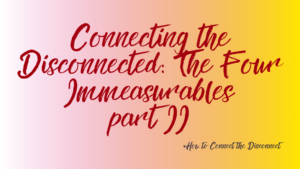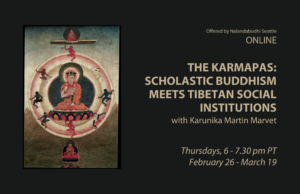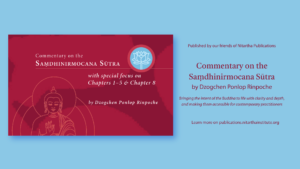One of the most cherished pieces of advice from my mom, along with making my bed and brushing my teeth, is to pay attention. She taught me to notice what’s happening inside me and around me. Remembering this has been incredibly helpful throughout my life, especially on my spiritual journey.
Paying attention encourages direct experience, without hope, fear, or denial. This awareness has been most poignant when bearing witness to my own suffering and that of others. The Buddhist teachings tell us that suffering is pervasive in the world, that its cause is clinging to an illusory sense of self, and that we can achieve peace—and they give us the methods to do that.
Buddhism breaks down suffering into three categories:
The suffering of suffering is pretty straightforward. It is physical or mental pain and hardship.
The suffering of change is a little more subtle. Even though we may not be aware of suffering in a given moment, due to the truths of impermanence and interdependence, our current experience will inevitably be the cause of future suffering.
Pervasive suffering is the universality of the previous two: an abiding feeling of anxiety that we will get what we don’t want and we won’t get what we do want. It means that all beings share the experience of suffering, and we all equally want to be free of it.
Deeply contemplating these three types of suffering and their impermanent and interdependent nature can motivate us on the path and inspire us to be of benefit to beings. We can connect with the empathy, kindness, and compassion that are always within us and actively engage them to help a world that is in great need. We can use suffering to transcend suffering.
I am grateful for the example of stillness and silence of my father’s meditation, the powerful reminders of life’s impermanence, the beautiful and nourishing gardens of my youth, and the good advice from my mom to pay attention. By bringing these together in the context of meditation, my parents’ union has profoundly benefited my life. It’s my wish that you benefit too.
Fourth, the homes, friends, wealth, and comforts of samsara
Are the constant torment of the three sufferings,
Just like a feast before the executioner leads you to your death.
I must cut desire and attachment, and attain enlightenment through exertion.
Contemplation Exercise
- To start an analytical meditation session, find a quiet space, and set your intention.
- Do a few minutes of calm abiding meditation, and then slowly recite the verse.
- Engage your thinking mind with curiosity and creativity. Go beyond the words to experience the meaning that they convey. Allow yourself to deeply feel what they mean to you.
- During the session, you can periodically repeat the verse to refresh your thinking.
- Conclude with a few minutes of calm abiding meditation, and offer any goodness from the session to others.

Nick Vail is a Karunika (teacher) for Nalandabodhi who lives in Maine.
A single parent, he enjoys quality time with his son, being in nature, playing the guitar, singing, dancing, and meditation.






